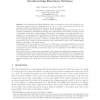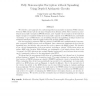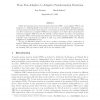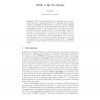100
Voted
IACR
2011
14 years 18 days ago
2011
GOST is a well known block cipher which was developed in the Soviet Union during the 1970’s as an alternative to the US-developed DES. In spite of considerable cryptanalytic eff...
IACR
2011
14 years 18 days ago
2011
Generic decoding of linear codes is the best known attack against most code-based cryptosystems. Understanding and measuring the complexity of the best decoding technique is thus n...
100
Voted
IACR
2011
14 years 18 days ago
2011
Zero knowledge sets (ZKS) [18] allow a party to commit to a secret set S and then to, non interactively, produce proofs for statements such as x ∈ S or x /∈ S. As recognized in...
86
Voted
IACR
2011
14 years 18 days ago
2011
The hardware-attractive block cipher family KTANTAN was studied by Bogdanov and Rechberger who identified flaws in the key schedule and gave a meet-in-the-middle attack. We revis...
91
Voted
IACR
2011
14 years 18 days ago
2011
We aim at constructing adaptive oblivious transfer protocols, enjoying fully simulatable security, from various well-known assumptions such as DDH, d-Linear, QR, DCR, and LWE. To t...
114
click to vote
IACR
2011
14 years 18 days ago
2011
Protocols for generic secure multi-party computation (MPC) come in two forms: they either represent the function being computed as a boolean circuit, or as an arithmetic circuit o...
128
Voted
IACR
2011
14 years 18 days ago
2011
The Keccak hash function is one of the five finalists in NIST’s SHA-3 competition, and so far it showed remarkable resistance against practical collision finding attacks: Afte...
78
Voted
IACR
2011
14 years 18 days ago
2011
92
Voted
IACR
2011
14 years 18 days ago
2011
Unlike the standard notion of pseudorandom functions (PRF), a non-adaptive PRF is only required to be indistinguishable from random in the eyes of a non-adaptive distinguisher (i....
90
Voted
IACR
2011
14 years 18 days ago
2011
KISS (‘Keep it Simple Stupid’) is an efficient pseudo-random number generator originally specified by G. Marsaglia and A. Zaman in 1993. G. Marsaglia in 1998 posted a C versio...




